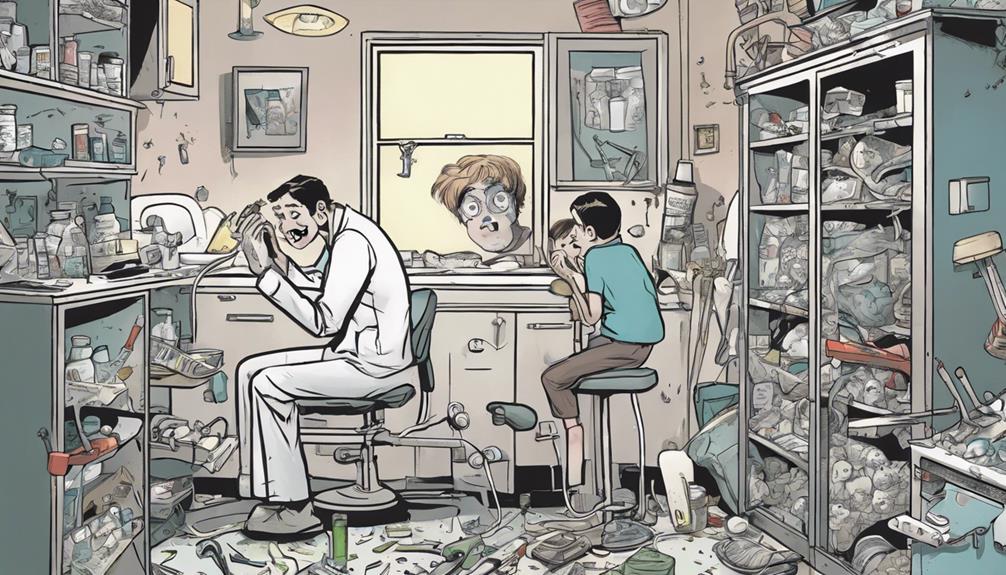DIY dental treatments for kids might seem like a smart way to save money, but they can pose serious risks. You can easily misdiagnose dental issues, leading to complications like infections or further damage. Popular DIY methods, like cavity filling or makeshift braces, often use unsafe materials and lack professional oversight, which can result in painful injuries and long-term damage. Without the right care, you could end up spending far more on correcting these mistakes than if you had sought professional help in the first place. Discover why prioritizing expert dental care is vital for your child's health.
Key Takeaways
- DIY dental treatments can lead to serious complications, including infections and further damage to children's teeth.
- Misdiagnosing dental issues with home methods often exacerbates existing problems, resulting in costly corrective treatments.
- Household items used in DIY dentistry can cause painful injuries and increase the risk of cavities.
- Professional care ensures tailored preventive measures, reducing the likelihood of DIY risks and promoting children's overall dental health.
Understanding DIY Dentistry

DIY Dentistry involves using home-based methods to tackle dental problems that usually need professional care, often driven by the desire for affordable solutions. Many people turn to DIY treatments to address oral health problems like tooth decay and gum damage, believing they can save money.
However, the dangers of DIY Dentistry are significant. Major organizations, including the American Academy of Pediatric Dentists, have warned against self-treatment practices, highlighting how improper techniques can lead to serious dental complications.
For instance, using household items for cavity fillings or whitening can seem tempting but can result in infections or worse damage. Without sterile conditions or professional oversight, you're risking your child's dental health. Many DIY methods lack the necessary expertise, which increases the chance of exacerbating existing issues.
Popular DIY Dental Practices

Many parents might be tempted to explore popular DIY dental practices for their kids, unaware of the potential risks involved.
DIY cavity filling using household items can misdiagnose underlying issues, leading to dental complications that worsen oral health. Self-whitening methods, often showcased on social media, frequently involve unregulated products that can seriously damage your child's teeth and gums.
Additionally, DIY braces might seem like a cost-effective solution, but they pose serious risks, including tooth loss and misalignment due to unmonitored treatment. One-size-fits-all veneers available online could harm your child's gums and jaws, primarily due to an improper fit and lack of professional oversight.
Even advice about tooth extraction from DIY resources often overlooks the surgical risks that can be particularly dangerous for developing mouths.
It's essential to realize that while these DIY methods may seem appealing, the potential harm to your child's teeth and overall oral health is far too great. Investing in professional dental care is always the safer choice.
Health Risks of DIY Treatments

Exploring at-home dental treatments can expose your child to serious health risks, including infections from non-sterile techniques and products.
DIY treatments often lead to misdiagnosis of dental problems, which can exacerbate issues and result in long-term complications that necessitate professional intervention. For example, using unregulated whitening products can cause irreversible damage to your child's teeth and gums, leading to sensitivity and chronic health issues.
Incorrect application of DIY braces or aligners can result in misalignment and jaw pain, affecting your child's dental development. You might think you're saving money by avoiding a dentist, but the financial implications of correcting these mistakes can be substantial. The costs associated with professional care to fix damage from DIY treatments often far exceed any initial savings.
Infections and other health risks stemming from these practices can also contribute to stress and anxiety for both you and your child. It's important to understand that while DIY treatments may seem like a quick fix, they can lead to more serious problems down the line.
Prioritizing your child's oral health is essential, and that means opting for professional care over potentially harmful DIY methods.
Importance of Professional Care

Choosing professional dental care for your child not only helps prevent serious health risks associated with DIY treatments but also guarantees that their unique dental needs are met with expert attention.
Pediatric dentists specialize in handling children's dental health, providing tailored preventive care that promotes long-term oral health. By scheduling regular professional visits every six months, you can ascertain that your child receives thorough examinations to identify any underlying issues that may otherwise go unnoticed.
Professional cleanings are far more effective at removing plaque and tartar than home methods, greatly reducing the risk of cavities and gum disease. These visits help your child build a positive relationship with dental care, which can lessen anxiety about future appointments.
Additionally, early intervention by dental professionals can address orthodontic issues before they escalate, paving the way for healthier dental alignment.
Investing in professional dental care means prioritizing your child's overall well-being. By emphasizing the importance of regular visits and expert attention, you can help foster a lifetime of good oral health habits and ascertain that your child's smile remains bright and healthy.
Consequences of DIY Mistakes

Even minor DIY dental errors can lead to serious, lasting consequences for your child's oral health. Mistakes like incorrectly applying DIY braces can cause tooth misalignment, resulting in jaw pain and the need for costly orthodontic treatment down the line. You might think you're saving money, but the financial implications of these errors often outweigh any initial savings.
Moreover, DIY procedures can cause irreversible damage, such as enamel erosion, increasing the risk of cavities and long-term dental complications. Improper use of household items for dental care may lead to painful injuries and heightened sensitivity, making professional dental care essential.
Untreated oral infections are another risk; these infections can spread quickly in children and may require extensive medical intervention. The complications from DIY treatments can lead to additional procedures, greatly driving up costs.
You might find yourself in a situation where a simple DIY fix ends up costing far more than a visit to a qualified dentist. Prioritizing your child's oral health means avoiding these DIY pitfalls and seeking professional care instead.
Educating Parents and Caregivers

As a parent or caregiver, it's vital to recognize the importance of professional guidance when it comes to your child's dental health.
Unsupervised treatments can lead to serious risks, including infections and permanent damage.
Staying informed and opting for regular dental check-ups can help you avoid these complications and guarantee your child's smile stays healthy.
Importance of Professional Guidance
Professional dental guidance is essential for ensuring your child's oral health needs are met effectively, as their requirements differ markedly from those of adults. Relying on DIY methods can lead to complications that professional treatments would prevent. Here are some key reasons why you should prioritize professional dental care:
- Specialized Care: Pediatric dentists are trained to address children's unique dental needs, ensuring their healthy development.
- Early Detection: Regular dental check-ups can help identify potential issues early, reducing the risk of serious complications down the line.
- Education for Parents: A pediatric dentist can educate you about safe oral health practices, so you avoid resorting to DIY treatments that may be harmful.
- Reducing Dental Anxiety: Children who receive regular professional care are less likely to experience dental anxiety, fostering a positive attitude towards oral health.
Risks of Unsupervised Treatments
Unsupervised DIY dental treatments for kids can lead to serious complications, making it vital for parents and caregivers to understand the risks involved. When you attempt a DIY approach, you might expose your child to infections and tooth loss due to non-sterile environments. Kids often struggle to articulate their symptoms, which can result in misdiagnosis and ineffective home remedies that might worsen dental problems. It’s important for parents and caregivers to seek professional dental care for their children, as dentists are trained to diagnose and treat oral health issues. The dangers of DIY dental treatments can also include damage to the surrounding teeth and gums, as well as the potential for permanent harm to the child’s dental structure. By prioritizing professional dental care, parents and caregivers can ensure the health and safety of their children’s teeth and gums.
Using improper tools or materials can cause irreversible damage to your child's teeth and gums, leading to increased sensitivity and a higher risk of cavities. Without professional dental oversight, you risk missing underlying pathology that could be significant to your child's oral health. This oversight is essential for identifying issues that DIY methods simply can't address.
Moreover, trying to save money with these treatments can lead to significant financial burdens later on. The costs of corrective treatments by qualified dentists often outweigh any savings you might've gained. Prioritizing professional dental care not only protects your child's smile but also guarantees their overall well-being and health.
Investing in a dentist's expertise is a far better option than maneuvering through the unknowns of DIY dental care.
Encouraging Safe Dental Habits

When it comes to your child's dental health, professional guidance is essential.
By establishing healthy routines like regular check-ups and proper brushing, you can set them up for a lifetime of good habits.
Let's explore how these practices can keep your child's smile bright and reduce the temptation for DIY treatments.
Importance of Professional Guidance
Regular dental visits are vital, as they help you catch potential issues early and establish safe oral habits for your child. Relying on DIY dental treatments can pose significant risks, including overlooking underlying dental issues. Here's why seeking professional guidance from a pediatric dentist is important:
- Comprehensive Examinations: Regular check-ups allow for thorough assessments of your child's oral health, identifying problems before they escalate.
- Preventative Care: A pediatric dentist provides tailored advice and treatments that promote healthy oral habits, reducing the need for risky DIY methods.
- Professional Oversight: Trusting qualified professionals guarantees that your child's dental care is managed safely, minimizing the risks associated with DIY treatments.
- Educational Resources: Dentists can offer valuable insights and strategies that empower you and your child to maintain strong oral hygiene practices.
Establishing Healthy Routines
How can you help your child develop safe dental habits that last a lifetime?
Start by establishing healthy routines around regular dental care. Encourage your child to brush twice a day with fluoride toothpaste, which can reduce cavities by up to 40%. Pair this with flossing daily to remove plaque and food particles that brushing alone can't reach, ensuring proper oral hygiene.
Scheduling biannual dental check-ups is crucial. Professional cleanings and examinations can catch early signs of dental issues, protecting your child's health and safety from more invasive treatments later on.
Don't overlook the importance of a balanced diet. Teach your child to enjoy fruits, vegetables, and dairy, as good nutrition supports healthy teeth and gums.
Frequently Asked Questions
Is Dental Cleaning Safe for Kids?
Yes, dental cleaning is safe for kids when performed by a qualified pediatric dentist. They use specialized tools and techniques to guarantee your child's teeth are cleaned effectively while protecting their delicate gums from potential harm.
What Are the Consequences of Untreated Dental Disease in Children?
Ignoring your child's dental issues could release a world of pain, chaos, and costly emergencies. Untreated decay can lead to infections, speech problems, and long-term complications that'll crush their confidence and academic success. Don't wait!
How Do Dentists Numb Teeth for Kids?
Dentists numb teeth for kids using local anesthetics like lidocaine, carefully dosed by weight. They may apply topical gel first and sometimes use nitrous oxide to help your child relax during the procedure.
What Is DIY Dentistry?
Imagine tackling a toothache with a home remedy; that's DIY dentistry. It involves using at-home methods to fix dental problems, often without professional advice, which can lead to serious complications and long-term issues.
Are DIY Dental Treatments Safe for Kids in Relation to the Tooth Fairy’s New Sidekick?
Parents often wonder if DIY dental treatments are safe for kids in relation to the tooth fairy’s new sidekick. It’s crucial to consult a dentist before attempting any homemade remedies. While the tooth fairy’s new sidekick can bring joy, children’s dental health should always be entrusted to professionals.
Conclusion
In the end, while DIY dental treatments might seem like a quick fix, they can lead to serious complications for your kids.
Just like trying to fix a computer with a hammer, it rarely works out well.
Prioritizing professional dental care guarantees your child's smile stays healthy and bright.
So, let's leave the dental work to the experts and focus on encouraging safe habits that keep those tiny teeth sparkling for years to come.









